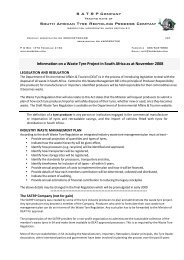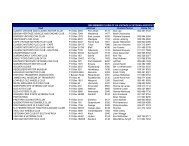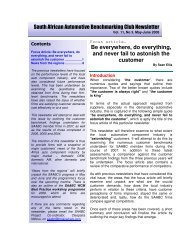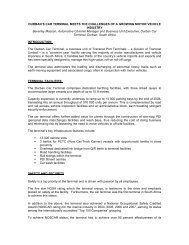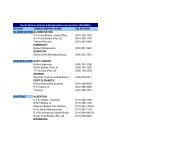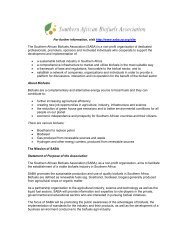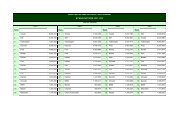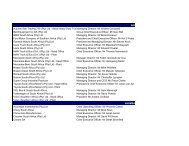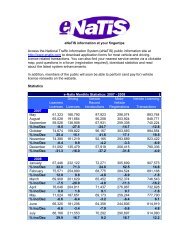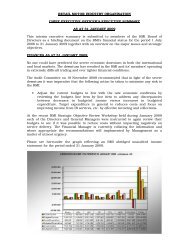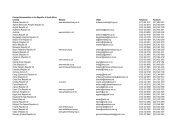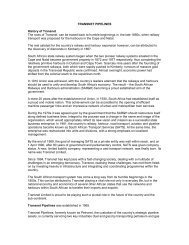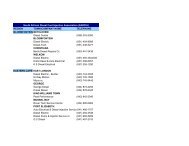Toyota South Africa Sustainability Report 2008 - Automotiveonline ...
Toyota South Africa Sustainability Report 2008 - Automotiveonline ...
Toyota South Africa Sustainability Report 2008 - Automotiveonline ...
Create successful ePaper yourself
Turn your PDF publications into a flip-book with our unique Google optimized e-Paper software.
<strong>Sustainability</strong> <strong>Report</strong>_14-10-<strong>2008</strong>:Layout 1 10/14/08 2:43 PM Page 5<br />
Technical modifications alone were not sufficient to deliver the required quality, and<br />
to ensure buy-in from employees, a unique ‘Excellence in Customer Quality Challenge’<br />
(E-CQC) was rolled out in May 2007. The aim of E-CQC was to create a quality mindset<br />
across the <strong>Toyota</strong> network, so that <strong>Toyota</strong> can deliver on the quality expectations of<br />
customers in the various markets into which the new Corolla will be launched. From<br />
a sustainability perspective, the E-CQC challenge emphasises engagement with all<br />
stakeholders in the life-cycle of the vehicle.<br />
Corporate Philosophy<br />
<strong>Toyota</strong> is committed to pursuing sustainability in three specific areas:technology (including<br />
research and development), manufacturing and social contribution. Our position in society<br />
is entirely dependent on achieving growth that maintains a balance between corporate<br />
activities and environmental conservation, as well as between vehicle volume and quality.<br />
In all our activities and all our interactions, our aim is to create harmonious and<br />
sustainable relationships with all our stakeholders, and to respect the environment in<br />
which we operate. Recognising that our success depends on responsible social<br />
development and the integrity of environmental systems, guidance has been developed<br />
to articulate how we contribute to these cornerstone business requirements.<br />
<strong>Sustainability</strong> principles have been core to <strong>Toyota</strong>’s business model and success since its<br />
founder, Mr Sakichi Toyoda developed the <strong>Toyota</strong> Precepts, which evolved into the<br />
Guiding Principles for the company.<br />
PAINT LINE 3 BENEFITS ECONOMIC, SOCIAL, ENVIRONMENTAL AND QUALITY OBJECTIVES<br />
Paint Line 3 was opened in 2006, and adopted the same advanced paint technology used in<br />
TMC’s nine paint plants in Japan, including the use of metallic water-borne paint for the top<br />
coat, which greatly reduces potentially harmful atmospheric emissions. Paint Line 3 is one of<br />
only five similar plants commissioned by <strong>Toyota</strong> Motor Corporation globally.<br />
The new paint facility represents an investment of more than R1-billion, the Black Economic<br />
Empowerment (BEE) component of which was approximately R250-million, and is a major part<br />
of <strong>Toyota</strong>’s 220K production programme. The full investment will total R2,4-billion.<br />
From an environmental perspective, the transition to water-borne paint technology in Paint<br />
Line 3 will see our current Volatile Organic Compound (VOC) emissions reduce from 80gm/m 2<br />
to just 30gm/m 2 painted, which conforms fully with international standards. This will<br />
contribute to a 60% reduction in air emissions from the new plant, compared to our previous<br />
two paint plants. At full capacity, there will also be reduced electricity usage in terms of the cost<br />
per unit. Propane, used to fire the paint shop ovens, is replaced with methane-rich natural gas<br />
which has both environmental and economic benefits. Paint Line 3 also introduced significant<br />
quality benefits.<br />
The new facility created 4,000 job opportunities. Huge investment has also been made in<br />
training the people who work in the new<br />
paint plant. A total of 58 senior team<br />
members spent 60 person-months in Japan<br />
on training, at a cost of R12-million. A further<br />
250 team members have undergone training<br />
locally over a period of five months. <strong>Toyota</strong><br />
<strong>South</strong> <strong>Africa</strong> currently spends more than<br />
R70-million a year on direct training and skills<br />
development to support this increase in<br />
production capacity.<br />
Some other key sustainability results are:<br />
• 50% of expenditure on plant, machinery,<br />
services and civil engineering work was<br />
with local companies.<br />
• 60 contractors were involved in the project,<br />
77% of whom had BEE status.<br />
• A 60% reduction in air emissions, especially VOC emissions.<br />
All exhaust gases from the drying ovens and all volatile solvent emissions are processed<br />
through a Regenerative Thermal Oxidiser (RTO) where they are burnt off with the<br />
assistance of a gas burner.<br />
<strong>Sustainability</strong> <strong>Report</strong> <strong>2008</strong> 5



